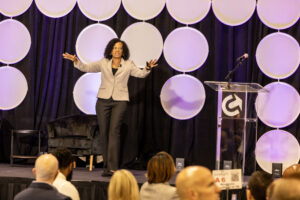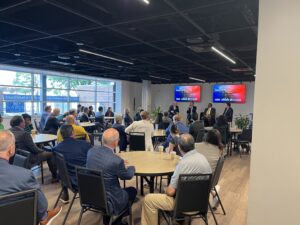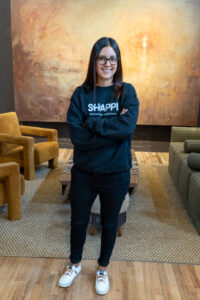Joda Thongnopnua
For Brandon Ellis, good barbeque is a family affair, and it’s all about practice. Growing up in Franklin, Kentucky, Ellis spent a lot of time on his family’s tobacco farm. He’d watch carefully as his uncle smoked a whole hog, celebrating special occasions. Years later, he’s now the owner and operator of Chatter Box Café in Chattanooga and attracting attention in national barbecue competitions.
“The barbecue I make every day — during the week — is my chance to practice for the next competition. I think my customers can tell, because I’m putting my best foot forward and always trying to make a better product.”
–Brandon Ellis, Owner, Chatter Box Café
Ellis is part of an inaugural class of entrepreneurs of color who make up the Accelerator Loan Program, an innovative impact investment fund and program that the Community Foundation of Greater Chattanooga (CFGC) launched in 2019. The program differs from the typical grantmaking work the Foundation is known for, instead offering access to opportunity, early capital and critical mentorship for emerging entrepreneurs who traditionally experience barriers to funding and other resources needed for their businesses to grow and thrive.
This kind of approach to philanthropy is often referred to as impact investing and it has the team at the Community Foundation excited about the future.
Traditionally, charitable foundations and philanthropies invest the majority of their assets in a traditional mix of stocks, bonds and other alternative assets, then allocate the profit toward grants for nonprofits that meet essential community needs.
As the Foundation team explored ways to leverage invested assets to not only return a profit, but also produce a social return locally, they created the Accelerator Loan Program, and turned the traditional foundation model on its head.
“For years, philanthropy and investing have been thought of as separate disciplines—one provides support for nonprofits and social causes, the other pursuing financial gain. But that’s beginning to change,” says Maeghan Jones, President and CEO of the Community Foundation of Greater Chattanooga. “We realized there is a tremendous amount of good we can achieve in our community if we engage not only our grantmaking resources, but our endowed assets to build a stronger, more inclusive city where everyone can thrive.”
Growing a business is one of the primary pathways for building wealth in America. But in surveying local community and business leaders, the Community Foundation heard that the hurdles for starting a business as a person of color are difficult to overcome, often locking out great ideas because of limited or no previous borrowing history, small credit blemishes, or lack of an established business track record. A recent study by the National Community Reinvestment Coalition found that black prospective business owners were frequently asked for documents never requested from white applicants, even when they had similar credit scores.
The team at the Community Foundation began work on a pilot program that could offer a glimpse at a solution: a loan program that created an accessible, supportive and flexible source of capital for business owners of color. But it wouldn’t stop there. The program also pairs every entrepreneur with mentorship from an experienced local entrepreneur, expanding access to the critical social networks that often support and bolster strong small businesses.
This work has taken on new urgency as COVID-19 has battered many small businesses run by entrepreneurs of color, with national data from the University of California at Santa Cruz estimating as many as 40% of black-owned businesses are at risk.
Bringing together partners from across the community, the program began to take shape.
Tennessee Valley Federal Credit Union (TVFCU) stepped in to underwrite and administer the loan program. LAUNCH Chattanooga identified diverse entrepreneurs ready with business plans, passion and business acumen. Private donors and the Community Foundation seeded a fund that would guarantee the loans. And experienced business owners and entrepreneurs volunteered their time and relationships to help mentor the next generation of emerging small businesses.
Barry Large knows what to look for in a business plan. Cutting his teeth in the old-school brick industry, he partnered with friends to start a small freight-forwarding business called Access America, which quickly became a leader in the logistics sector. He and his business partners eventually used the entrepreneurship lessons they'd learned to start a business incubator and venture fund of their own. Access America was acquired in 2014 by Coyote Logistics, which was acquired by international package delivery giant UPS the following year.
Today, Large serves as Chair of the impact investment committee for the Community Foundation of Greater Chattanooga and also serves as a mentor for the Accelerator Loan Program. He helped guide the creation of the program and outlined the learning process that would eventually lead to the program’s first investments.
“This was new work for the Community Foundation — exciting, needed and urgent — but new work,” says Large, who is also a founder and partner at Dynamo Accelerator and Fund, a venture capital firm focused on supply chain and mobility companies. “At the end of the day, we needed to make some deals and learn some things.”
So the fund began making its first investments.
Brandon Ellis used his loan to upgrade his equipment and scale his business, all while keeping his competition skills honed and ready. His business is now growing rapidly, with multiple food trucks and a thriving catering operation in addition to his brick-and-mortar location on Shallowford Road. He’s even started to mentor young people, hoping to pass along the lessons he’s learned along the way.

Another early loan was made to a Ghanian-American and Ooltewah High School teacher who began her transformation into a chocolatier by night. Ella Livingston’s business, Cocoa Asante, was inspired by a trip to Japan but uses cocoa sourced from Ghana. She started off making an assortment of chocolates, including her signature truffles. Livingston hopes to soon go from “bean to bar,” sourcing cocoa beans directly from farms and processing them herself before making her truffles.

“It definitely meant a lot,” Livingston says of what the Accelerator Loan Program meant for her business. “I was at the stage where I needed to get to the next step — to have access to a commercial kitchen, grow our inventory and get some marketing out there — the program came just in time.”
The Accelerator Loan Program has since made five loans to business owners of color across our community. The Community Foundation hopes it’s just the start and that the program sparks conversation about how our community can get creative with impact investing, capital and even risk — all while supporting a diverse entrepreneurial ecosystem in Chattanooga.
“Philanthropy needs new skills and tools to assess risk differently,” says Dwayne Marshall, Vice President of Community Investment for the Community Foundation of Greater Chattanooga. “We had to push ourselves to shift our perspective from ‘what investments promise the highest returns’ to thinking about the risk of missing an opportunity to narrow the wealth gap here in our city—and when you think about all of the positive impacts of having a thriving community of entrepreneurs of color, it’s well worth the risk.”
By broadening access to entrepreneurial success for more people, we could see a transformative impact on our local economy for generations to come.
Accelerator Loan Fund Program Businesses
- Chatter Box (6801 Shallowford Rd.)
- Cocoa Asante (Order online; now shipping)
- Lil Mama’s Chicago Style Hoagy (818 Georgia Ave., Ste 114)
- Neutral Ground (422 E. M L King Blvd.)
- Wing Top Tops (Food truck location changes regularly)
| Image |






